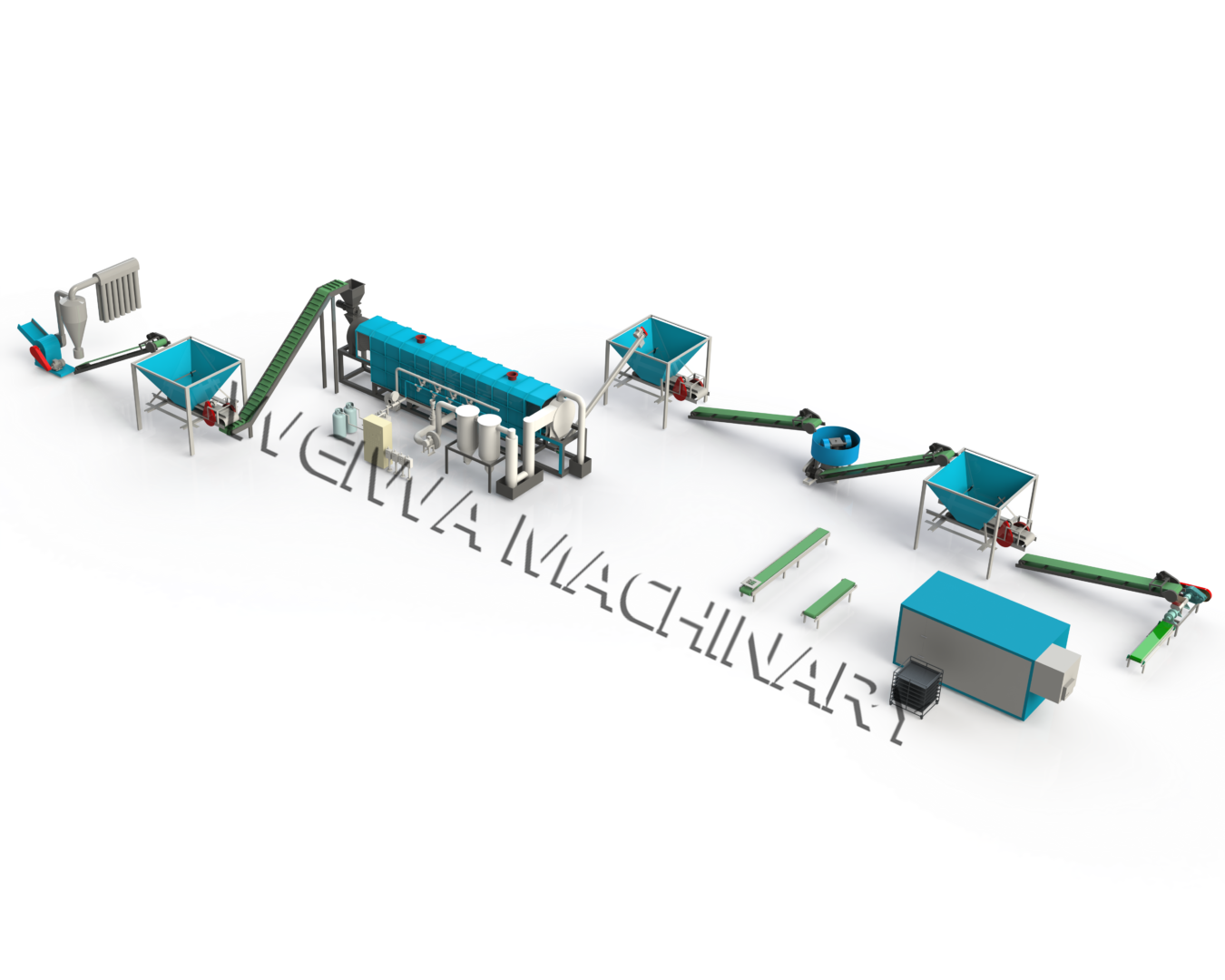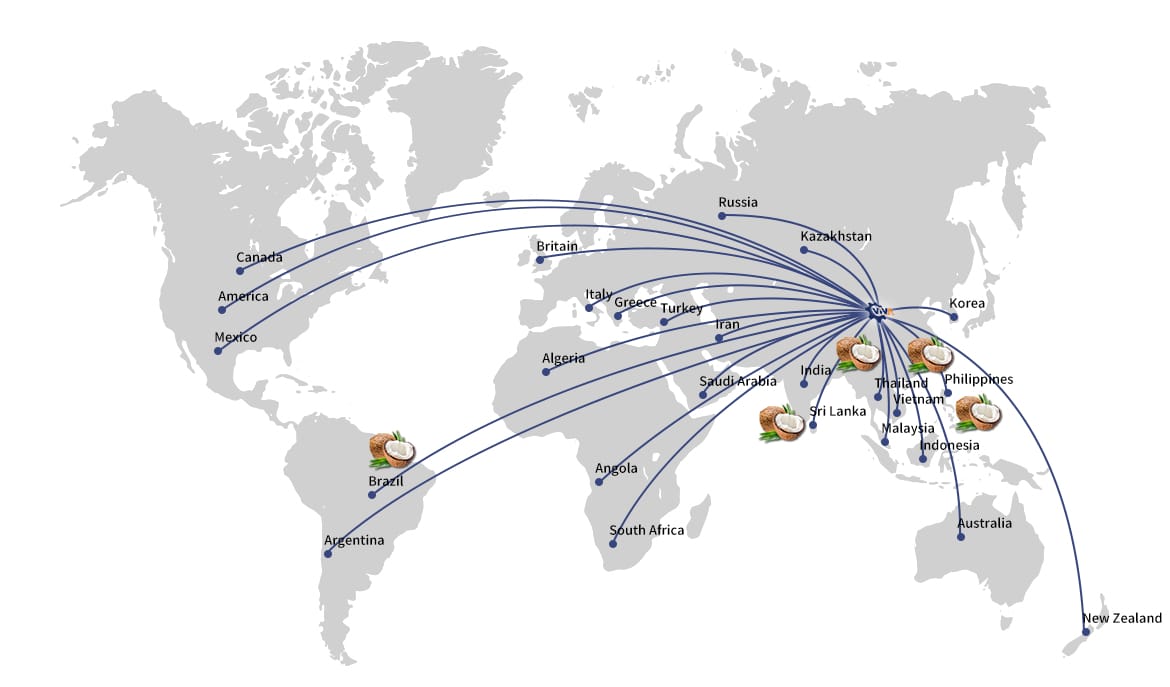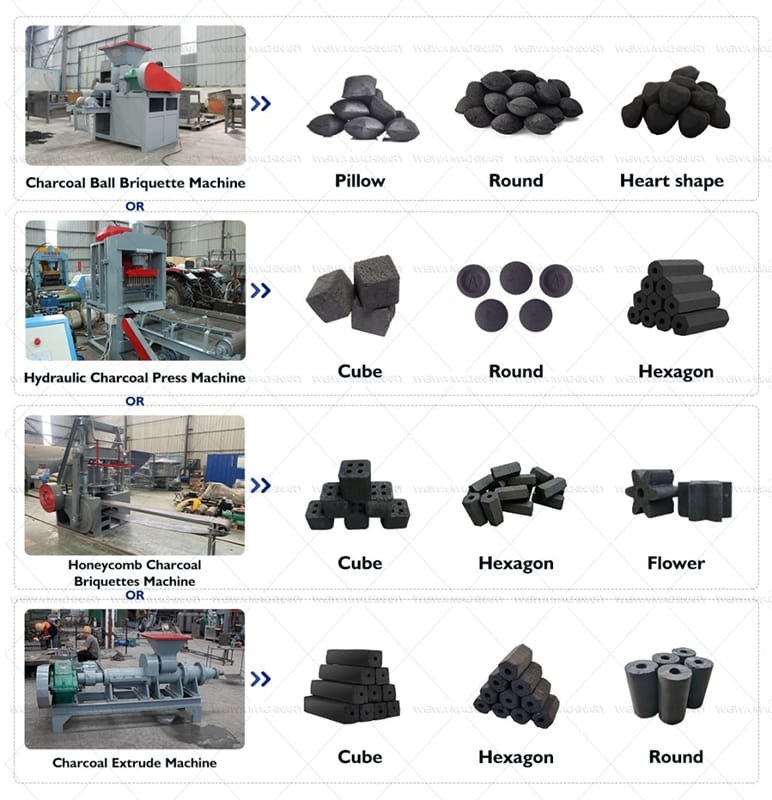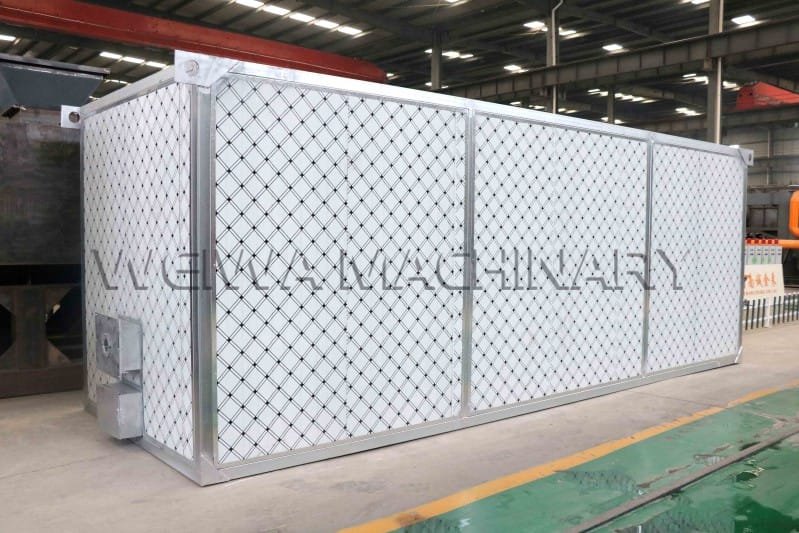Introduction to Coconut Shell Charcoal Briquettes
ในช่วงไม่กี่ปีที่ผ่านมา, ความต้องการเชื้อเพลิงทดแทนที่ยั่งยืนและเป็นมิตรกับสิ่งแวดล้อมมีเพิ่มขึ้น, making Coconut Shell Charcoal Briquettes a highly sought-after product. Derived from หอยมะพร้าว, ถ่านอัดก้อนเหล่านี้ไม่เพียงแต่เป็นแหล่งพลังงานหมุนเวียนที่ดีเยี่ยม แต่ยังเป็นโอกาสทางธุรกิจที่ทำกำไรอีกด้วย. At เครื่องจักร Weiwa, we specialize in providing efficient coconut shell charcoal briquette making production lines that transform waste coconut shells into high-quality charcoal briquettes with minimal environmental impact.
Why Choose Coconut Shell for Charcoal Production?
Coconut shells are a rich, carbon-dense biomass material that makes an excellent raw material for charcoal production. Unlike traditional wood charcoal, coconut shell charcoal offers several advantages:
- High Fixed Carbon Content: Ensures a longer burn time and higher energy output.
- Low Ash & Smoke Emission: Makes it cleaner and more environmentally friendly.
- Durable & Dense Structure: Ideal for briquetting without excessive binding agents.
- Waste Utilization: Converts agricultural waste into a valuable commodity.
Given these benefits, Coconut Shell Charcoal Briquettes are widely used in BBQs, hookahs, industrial heating, and even as activated carbon.
Coconut Shell Charcoal Briquette ทำสายการผลิต
The coconut shell charcoal briquette production line involves several key stages, each crucial for producing high-quality briquettes efficiently. Below is a detailed breakdown of the entire workflow:
1. Raw Material Collection & Pre-Treatment
The process begins with collecting dry coconut shells, preferably those that have been sun-dried or mechanically dried to reduce moisture content (ideally below 15%). Proper drying ensures better carbonization efficiency and reduces energy consumption in later stages.
- การบดขยี้ (Optional): If the shells are too large, a เครื่องบด or hammer mill may be used to break them into smaller pieces for uniform carbonization.
2. การทำให้เป็นคาร์บอน – Turning Shells into Charcoal
The carbonization process is the heart of charcoal production, where coconut shells are heated in an oxygen-free environment to decompose organic matter into charcoal.
In the video, rice husks are used as an example
Working Principle of Carbonization:
In the following video, we take rice husks as an example
- Coconut shells are fed into a เตาเผาคาร์บอน (rotary kiln, brick kiln, or continuous carbonizer).
- The furnace is heated to 300–600°C in an oxygen-deprived chamber (to prevent combustion).
- Over 4–8 hours, the shells undergo pyrolysis, releasing volatile gases and leaving behind solid charcoal.
At เครื่องจักร Weiwa, we offer อุปกรณ์คาร์บอนขั้นสูง that maximizes yield while minimizing emissions.
3. การบดขยี้ & Grinding the Charcoal
The resulting ถ่านเปลือกมะพร้าว is brittle and needs to be crushed into fine powder (usually 3–5 mm or finer) for briquetting.
- เอcharcoal crusher or hammer mill is used to break down the charcoal into a consistent size.
- Proper particle size ensures better binding and uniform briquette formation.
4. Mixing with Binder (Optional)
While some processes use binder-free briquetting, many manufacturers add a natural binder (เช่น, starch, molasses, or clay) to improve cohesion.
- The binder is mixed with the charcoal powder in a mixing drum to ensure even distribution.
5. Briquetting – Forming the Briquettes
The briquetting process compresses the charcoal powder into uniform, dense briquettes using high pressure.
How Briquetting Works:
- The charcoal-binder mixture is fed into a briquette machine (usually a screw press or hydraulic press).
- Under แรงดันสูง (50–100 MPa), the mixture is molded into cylindrical, สี่เหลี่ยม, or oval briquettes.
- No additional glue is needed if the charcoal has sufficient natural binding properties.
At เครื่องจักร Weiwa, our coconut shell briquette machines are designed for ประสิทธิภาพสูง, low energy consumption, and durable performance.
6. Drying the Briquettes
Freshly pressed briquettes contain high moisture (10–20%) and must be dried to ensure hardness and long shelf life.
- Natural Sun Drying: Slow but cost-effective (takes 2–3 days).
- Mechanical Drying (Hot Air Dryer): Faster (6–12 hours) and more controlled, ensuring consistent moisture levels below 8%.
7. การบรรจุหีบห่อ & Storage
Once dried, the briquettes are:
- Cooled to room temperature.
- Packaged in bags or sacks for storage and distribution.
- Stored in a dry place to prevent moisture absorption.
Working Principles of the Coconut Shell Charcoal Briquette Production Line
The entire production line operates on a systematic flow, ensuring ประสิทธิภาพ, คุณภาพ, and minimal waste.
Key Principles:
- Thermal Decomposition (การทำให้เป็นคาร์บอน): Converts biomass into charcoal via controlled pyrolysis.
- Mechanical Compression (การทำสี): Uses high pressure to form dense briquettes without binders (or with minimal binders).
- Moisture Control (การทำให้แห้ง): Ensures briquettes are hard, ทนทาน, and long-lasting.
ของเราWeiwa Machinery equipment is engineered to optimize each stage, reducing energy waste and maximizing output.
Market Potential & Business Opportunities
The global demand for coconut shell charcoal briquettes is growing rapidly due to:
1. Eco-Friendly Fuel Alternative
- Used in households, restaurants, and industries as a cleaner alternative to wood or coal.
- Preferred for hookahs, shisha, and BBQs due to its aroma and clean burn.
2. Activated Carbon Industry
- Coconut shell charcoal is a prime raw material for activated carbon, used in กรองน้ำ, การฟอกอากาศ, and medical applications.
3. Export Potential
- Countries like Japan, Korea, Europe, and the Middle East import high-quality coconut shell briquettes in bulk.
4. Government Support & Sustainability Trends
- Many governments promote biomass energy projects, offering subsidies or tax incentives for charcoal producers.
By investing in a coconut shell charcoal briquette making production line, entrepreneurs can tap into a lucrative, eco-friendly, and high-demand market.
Why Choose Weiwa Machinery for Your Production Line?
At เครื่องจักร Weiwa, we are a leading manufacturer of biomass processing equipment, specializing in coconut shell charcoal briquette production lines. Here’s why we are your best choice:
✅ High-Quality Equipment – Our carbonizers, crushers, เครื่อง briquette, and dryers are built for durability and efficiency.
✅ Customizable Solutions – We design turnkey production lines tailored to your production scale.
✅ Energy-Efficient Technology – Our machines minimize energy consumption and emissions.
✅ Global Expertise – We have supplied equipment to เกิน 50 ประเทศ, ensuring reliable support and after-sales service.
✅ Competitive Pricing – Get premium machinery at factory-direct prices with flexible payment options.
Start Your Coconut Shell Charcoal Briquette Business with Weiwa Machinery
The coconut shell charcoal briquette making production line is a profitable, sustainable, and in-demand business. With the right equipment and process, you can convert waste coconut shells into high-value charcoal briquettes for domestic and international markets.
เครื่องจักร Weiwa provides complete, เชื่อถือได้, and efficient production solutions to help you succeed in this industry. Whether you’re a small-scale entrepreneur or a large manufacturer, we have the right equipment and expertise to support your venture.
Contact us today to get a free consultation, quotation, or equipment demo for your coconut shell charcoal briquette production line.
เกี่ยวกับ เครื่องจักร Weiwa
เครื่องจักร Weiwa is a professional manufacturer of biomass processing equipment, specializing in เครื่องทำถ่าน, briquette presses, carbonization furnaces, and drying systems. ด้วยyears of experience and a global customer base, we are committed to providing innovative, energy-efficient, and cost-effective solutions for sustainable energy production.
Let us help you turn coconut shells into profit—partner with Weiwa Machinery today!










 Wechat
Wechat

 +8613838093177
+8613838093177